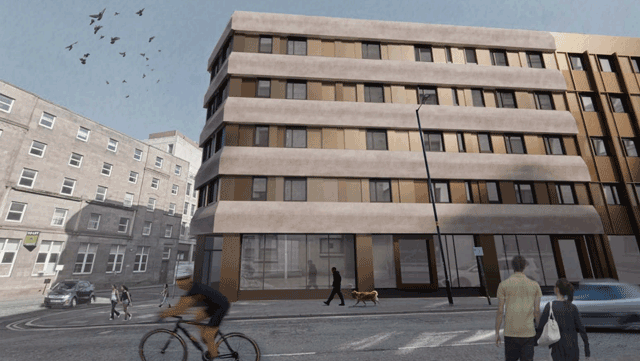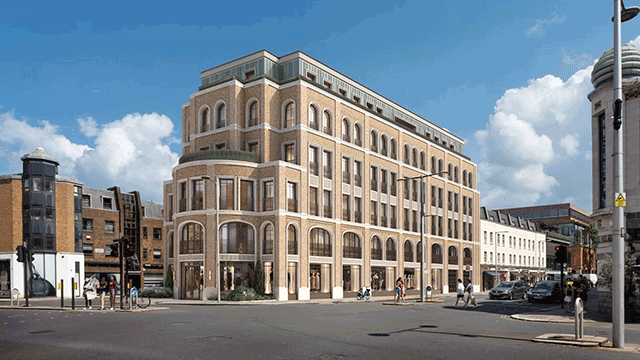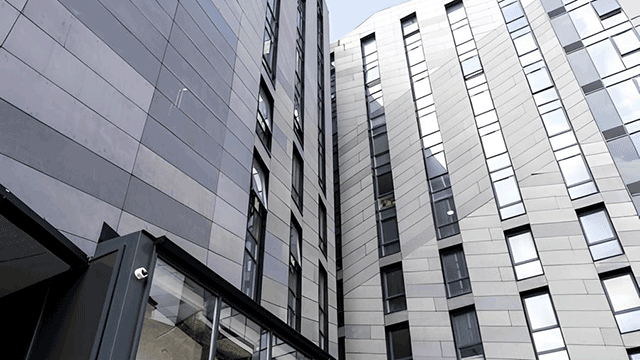When EG arrives at the new Sheffield headquarters of Henry Boot, the move-in is still underway. The company’s name has yet to be added to floors five, six and seven on the tenants’ board in the reception of the Isaacs Building. A fancy open staircase between floors is hidden by dust sheets, still being made. Chief executive Tim Roberts, showing EG around, has to shout over the noise of construction.
Welcome to the work-in-progress that is running one of the UK’s largest listed real estate development and construction companies. Sure, the group has now been listed on the London Stock Exchange for more than a century. But for Roberts, a former head of offices and residential at British Land who took the top job at Henry Boot at the start of 2020, the focus is on plotting a path ahead, not just holding on to heritage.
The new digs are part of that. Back in March the company said it would move to the Isaacs Building, part of Sheffield’s Heart of the City development, and put Banner Cross Hall, its base for the past 90 years on the edge of the city, up for sale. That was no simple decision given its ties with the Boot family, still the major shareholder in the company. But the argument was clear.
“There was a lot of connection with the family… a lot of emotion. But it was a listed hall, about 16,000 sq ft, and we’ve got probably a full complement of people in head office of 90 – and less and less do you have all 90 people in all week,” Roberts says. “We looked at whether we could refurbish it and we could have, but it would have cost lots of money. What we were really worried about was that we would spend a lot of time refurbishing it and still wouldn’t have space like this [he gestures around the Henry Boot reception at the Isaacs Building]… So we made a decision to move here.”
In August, Henry Boot sold Banner Cross Hall to Davison Property Investment, which plans to restore the Grade II listed building, maintaining its role as workspace as well as a restaurant and café for the public. The building is understood to have sold for north of its book value of roughly £2.5m.
“We got a good price. We got a good buyer who is going to do some good things with the building,” Roberts says. “It sounds a bit hard, but we’ve drawn a line under our time at Banner Cross Hall. We’re pleased that it’s helped Henry Boot. But what’s the future? The future is this.”
Stick to your knitting
When Roberts took the top seat at Henry Boot, he would describe it as a real estate company that everyone had heard of but whose business not everyone understood. Over the almost four years since, he has been rethinking the strategy across its land, development and construction arms.
“I thought that Henry Boot was fundamentally a good-quality business with strong commercial acumen and lots of potential, lots of ability to find deals,” he says today. “But what it also needed was more strategic direction… We set ambitions and we’ve managed to keep on achieving them. We’re still managing to get enough activity in the businesses, we’re still growing the businesses.
“The difference between NAV and capital employed is not great at Henry Boot. Both of them are a proxy for the size of the business. And both are similar figures. Since March 2021, we’ve grown the capital employed from £315m to about £450m, and we’ve got an ambition to grow it to £500m.”
The group’s most recent interim results, published in September, showed a 25% increase in revenue but a fall in profit as costs continue to rise. The company has some £190m of development projects it has committed to, mostly industrial but also including an upmarket residential development in Birmingham known as Setl, which it has just started marketing internationally.
I know that I will be judged by total shareholder return. But hopefully I’ve got a period in which to do that. While I’m doing it, I can’t spend all my time worrying about the share price
A focus on regional cities feels natural for Roberts, who was born in Sheffield and now splits his time between there and London, where his family lives. His love of his hometown comes up regularly in conversation about the new office.
“It’s a proper city. I think it’s edgy as well. I quite like that and I think quite a lot of people in Sheffield like that,” he says. “But you’re also on the edge of the Peak District. So you’ve got that wonderful blend of an edgy, proper urban environment but within 10 minutes you can be in the Peak District.”
Is London’s lustre fading in comparison? Roberts, diplomatically, acknowledges some dulling. “I spent the vast majority of my career working in London and running a London portfolio,” he says. “I think it’s a very, very special place. But some of the gloss has come off London’s brand. Brexit and Covid haven’t helped it. It hasn’t bounced back from Covid as quickly as Manchester. At one stage if you invested money in London, you just made money. It’s not as clear cut as that [now].”
Little is. What has Roberts learned about steering a public company through an economic downturn?
“You’ve got to stick to your knitting,” he replies. “You’ve got to have a plan. You’ve got to be able to deliver it. And in the interim, there’s a lot of noise and you just can’t get distracted by the noise. I know that I will be judged by total shareholder return. But hopefully I’ve got a period in which to do that. While I’m doing it, I can’t spend all my time worrying about the share price. I am sensitive to shareholders and I want to provide shareholders with good returns and all these things. But what’s happening at the moment is bigger than Henry Boot.”
The UK equity market is out of favour, he says. “And if you’re in real estate or house building in an overall lowly rated market, you’re more lowly rated,” he adds. “So you can moan and groan about that, or you can think, ‘Well, that’s a price at a point in time. It’s also about investment trends you can’t do much about’. And if you accept that, then what you do is you stick to your knitting and trade through it.”
Full circle – almost
The company has been fitting out the new office since August and moved in the November week that EG visits. New staff from Henry Boot businesses around the country are in meeting rooms for an induction course. Roberts recognises and greets the newcomers.
What helps companies such as Henry Boot encourage staff back to the office? “Hopefully this,” Roberts says, gesturing around him.
I absolutely believe that if you want to have a successful business and if we’re going to have a productive country… we’ve got to have people back in the office
“Businesses are going to go full circle – maybe not quite full circle,” he says of the return to the office. “We’re not going to get back to five days a week, but I think people will be in three or four days… What we’re doing is making a really special environment so that people want to come in. I absolutely believe that if you want to have a successful business and if we’re going to have a productive country… we’ve got to have people back in the office.”
As EG leaves, workmen in the building’s lobby have taken down the tenants’ board and are adding “Henry Boot” to the top three floors. Roberts is making a mark quickly.
To send feedback, e-mail tim.burke@eg.co.uk or tweet @_tim_burke or @EGPropertyNews











